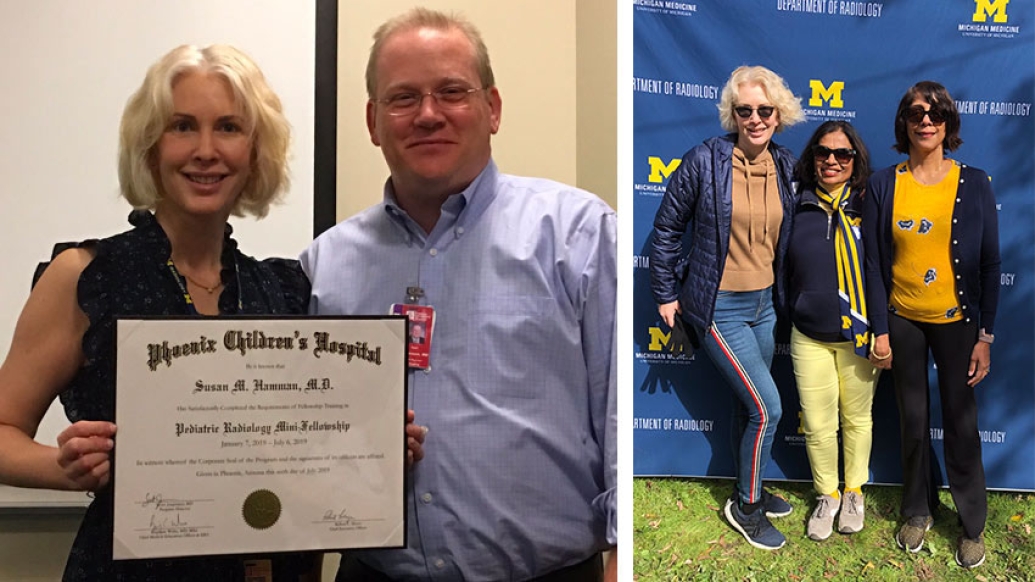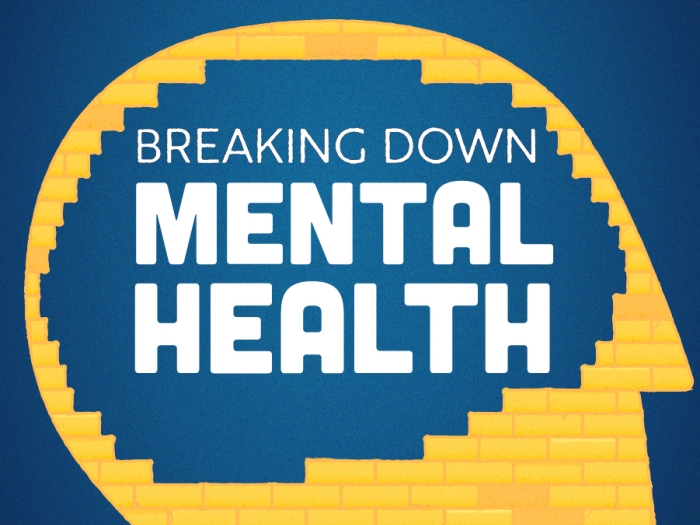She made her comeback. Now she wants to help change the culture of medicine.
5:00 AM
Author |

Sitting in her office on the third floor of C.S. Mott Children's Hospital, Susan Hamman thinks back to 2017. She was a part-time cross-country coach and substitute teacher who, between driving her kids all over Dallas, played some tennis.
"I'm a very mediocre player," Hamman says. "So, it's not as satisfying for a perfectionist to do something they're just OK at, even if it's pretty fun."
It wasn't Hamman's inability to attain the powerful groundstrokes of Serena Williams or hit Justine Henin's confounding angles that left her wanting more. The tennis, running, substituting – none were her calling.
MORE FROM THE LAB: Subscribe to our weekly newsletter
"Since I was a medical student, I dreamed of practicing pediatric radiology," says Hamman, M.D., who studied at the University of Louisville School of Medicine. "It seemed like an insurmountable goal, but I made it."
The journey to pediatric radiology is long and involved for any young clinician. Four years of medical school, four more years of diagnostic radiology residency training (now with a one-year transitional period) and a one-year fellowship.
But Hamman accomplished that over 20 years ago.
She completed her first pediatric radiology fellowship at the Children's Medical Center of Dallas in 1999. After the fellowship, she joined a private practice radiology group, taking on pediatric and general diagnostic responsibilities.
At the start of the first fellowship, Hamman's first child, Jack, was 17 months old. Over the next five years in Texas, she and her husband added two more children to their family. Slowly, it grew more difficult to be "all in" at her practice.
"It all sort of came to a crux," Hamman says. "There were so many competing interests, and I didn't hit my breaking point, but I got close enough that I knew I didn't want to hurt anyone in the process."
SEE ALSO: Parenting Conflicts May Stall Career Growth for Physician Moms
Hamman left her Dallas practice to focus on her children in 2004, expecting to take a little time off.
One year turned to two, then 10. Finally, after 14 years, and one-too-many lines missed on the tennis court, Hamman was ready to make her comeback.
The journey
"A lot of people were skeptical about a physician's ability to regain competence after such a long work gap," Hamman says. "It has been an unusual path and getting my foot back in the door was not easy."
Despite becoming a full-time parent and taking part-time jobs, Hamman read often and never let her medical license lapse. Starting in 2017, she gave radiology presentations, got certified as an EMT and attended a pediatric radiology conference to look for ways back in.
After almost a year, Hamman put in a call to her former private practice colleagues who then worked at Phoenix Children's Hospital. She began her second pediatric fellowship training in Arizona six months later.
"I really did have to relearn everything, but I had a good foundational training, so I found it actually came back very quickly," she says. "However, there were a lot of advances and changes in practice in those 14 years."
The fact that it's so difficult to integrate being a parent and practicing medicine is, I think, not unique to me at all.Susan Hamman, MD
After completing her mini-fellowship, Hamman passed her board exams and was fully certified as a pediatric radiologist – again. She joined Michigan Medicine August 2019 and was promoted to clinical assistant professor of radiology in March 2021.
"I feel like a brand new doctor," Hamman says. "I feel more a part of not only my practice, but the direction of the department. I'm able to participate in research and education."
Hamman took on the challenge of returning like a champion, says Vikas Gulani, M.D., Ph.D., chair of the Department of Radiology at Michigan Medicine.
Like Podcasts? Add the Michigan Medicine News Break on iTunes or anywhere you listen to podcasts.
"During the 14-year hiatus, she has accumulated vast and diverse experiences in life," Gulani says. "She has an admirable, optimistic outlook and not once have I heard her complain. Michigan Radiology is very fortunate to have her as a member of our faculty."
Work-life balance
In this second stint, Hamman's kids are older – out of the "liquid management" and carpool phases, relying less on mom for managing daily activities. While it's easier for her focus on the job, she notes, it shines a bigger spotlight on a systemic issue.
"For me and many physicians, a lot of our personal identity is tied up in our professional identity," Hamman explains. "The fact that it's so difficult to integrate being a parent and practicing medicine is, I think, not unique to me at all."
SEE ALSO: Moms on the Frontline
Hamman's husband continued working as a cardiothoracic surgeon after she became a full-time parent. For physicians like Amber Liles, M.D., M.P.H., though, that wasn't possible.
"Some people have a partner who will come in and make up the difference," says Liles, an interventional radiology fellow at Michigan Medicine. "In my case, my husband and I were both medical students when I had our first child, so the only way we could do it was with significant help from our families."
Liles' in-laws spent years living with her and her husband. But after leaving Oklahoma for Michigan, the couple eventually lost that support system, and she knows many people don't have one to begin with.
"We have really struggled the last five years, and I think the current medical system has a long way to go when it comes to supporting physicians and their families," Liles says. "There are also a lot of cultural issues that lead a lot of us, maybe erroneously, to believe that you can't call in sick or that family emergencies are not a thing."
Despite these issues, both Liles and Hamman say their experiences as working mothers have made them better physicians, which is why they want to make it better for working parents.
"I sometimes wonder how much more I could've done if I hadn't had kids, but being a parent has made me more efficient," Liles says. "My interactions with patients have changed because of who I am as a mother, so I don't regret it at all."
Hamman doesn't advise others to leave like she did, but her reasoning is driving some of her current research.
Productive conversations around addressing the issue of balance are happening at Michigan Medicine, but the entire traditional model of medicine needs to place more value on people's unique stories, she says.
"I think we would have a better health care system if the lived experiences of health care workers and their backgrounds were truly accepted and valued, and if we were encouraged to engage with our patients on that basis," Hamman says. "There is more work to do."
Paper cited: "The long and winding career path: lessons learned," Pediatric Radiology. DOI: 10.1007/s00247-020-04799-7

Explore a variety of healthcare news & stories by visiting the Health Lab home page for more articles.

Department of Communication at Michigan Medicine
Want top health & research news weekly? Sign up for Health Lab’s newsletters today!





